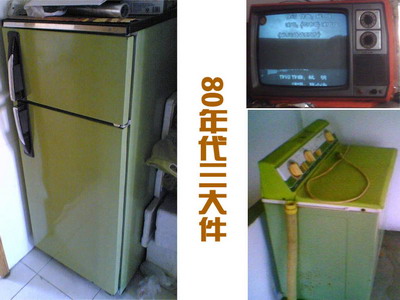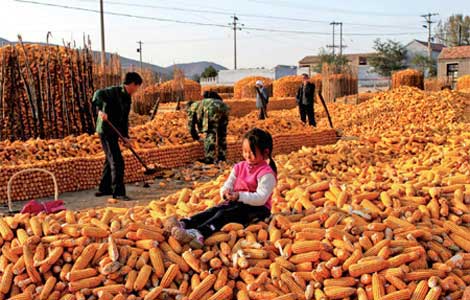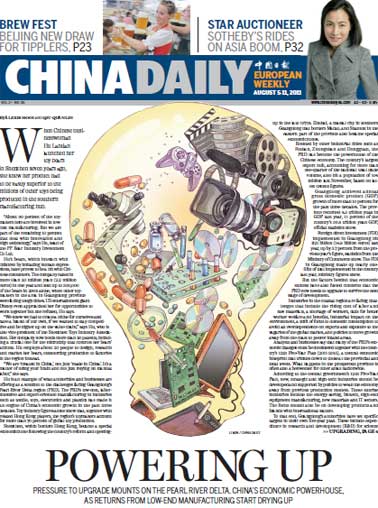Society
Money-troubled post-80s find naked wedding as way out
Updated: 2011-08-06 14:51
By Jia Xu (chinadaily.com.cn)
Unmarried? Blame the high wedding costs
Parents of twenty-somethings never expected that one day they would have to foot a bill of over 300,000 yuan ($44,000) to get a daughter-in-law or son-in-law, since getting married for them was just a 10,000 yuan($1300) business during the 1980s.
A report in the Xinmin Weekly magazine said the cost of today's average wedding had soared 30 times that of the 1980s.
Couples would then spend about 2000 yuan ($310) on a wedding banquet, inviting friends and relatives to attend their wedding ceremony.
As well as that, the remaining $1000 was usually spent on what was called the standard 'three big things'— a television set, a refrigerator and a washing machine.
|
 |
| File photo of the 1980s‘three big things' - a refrigerator (L), a television set (R-upper) and a washing machine(R-below).[Photo/chun.hpe.sh.cn] |
In the 1980s, buying a house was rare; couples usually lived together with the husband's family; but their own home is regarded as a must-have for newly-married couples nowadays.
The report indicated in 2007, an 80-square-meter house in Beijing's fourth north ring road cost about 400,000 yuan ($62, 077) - the then average property price was 5000 yuan ($775) per square meter. Yet in 2011, the price in the same area had soared up to an average 30,000 yuan ($4, 660) per square meter - a 600 percent rise within four years.
Despite the average annual income of Beijing residents increasing during the same period, the growth is far behind that of property prices.
According to statistics released on the Beijing Municipal Government website, incomes have increased by 26.4 percent within the same period - from 39,867 yuan to 50,415 yuan.
In 2007, it was conceivable for young couples to pay a 200,000 yuan housing installment if families from both sides gave support; but to pay around 600,000 yuan nowadays is really a big headache for normal families, the report said.
Naked marriage - cool but risky
A "naked marriage" is a Chinese term that refers to a marriage with the only cost being that of the nine yuan that needed to be paid to the Ministry Affairs Bureau as a legal marriage registration fee.
This new form of marriage has caught public attention in a culture where for thousands of years getting married was regarded as a family issue more an intimate arrangement between two individuals. Married couples often suggest that "pure love" isn't enough to guarantee a happy ending in reality.
|
 |
|
File photo: Naked Wedding, a recent hit TV series, tells the story of a young couple, Liu Yiyang (L) and Tong Jiaqian (R), who got married with no house, no car and no thick wad of banknotes. The plot follows their divorce after Tong finds it hard to live with Liu's family when it comes to real down-to-earth chores. In the show, Tong is characterized as a "princess", who was born in a well-off family whereas Liu was born in a workers' one.The difference in living circumstances as well as the vast conceptual gulf between the two families are the reasons behind the collapse in the marriage. Audiences say the show is a true reflection of the awkward reality the post 80s face. Since the show broadcast in June this year, discussions on Naked Wedding have followed swiftly after. Stressed by sky-high housing prices, young Chinese couples find ways to simplify the wedding rituals - opting for a "naked wedding".[Photo/sz.soufun.com] |
"Many couples blow marriage at the final stage when it involves buying a house," said Luo Zhiming, a marriage consultant at Beijing Hexintian Marriage Consulting Co. "Money is usually the most critical thing to settle after a wedding," she added.
For most young Chinese who earn an average wage and live an ordinary nine-to-five life, buying a house at present isn't realistic for them, Luo pointed out.
A Shanghai woman, Chen Bei, braved herself to marry her fiancé, living in a 2,000 yuan ($310) rented house in 2008.
Chen's husband was then an army soldier who earned 1,330 yuan ($206) a month and Chen is a high school teacher, earning a moderate monthly salary of 4,000 ($620) yuan.
When they planned to marry, their families could not raise the over 540, 000 yuan ($83,804) needed for a deposit on a new house.
Chen and her husband therefore decided to decorate a rented one. They spent 10,000 yuan ($1,551) on home decorating, and made it as their wedding room.
The couple also held a low-key wedding ceremony in a three-star hotel, inviting a few friends and relatives to attend.
As for a memento of their marriage, the newly-weds dropped the fantasy of a pair of expensive diamond rings and instead bought a pair of golden ones, which cost around 3,000 yuan all up.
"That's all our wedding expenditure, less than 23,000 yuan," Chen said.
Chen recalled her "reckless decision" was met with disapproval from many of her friends; some saying it was a risky move for her as a female, as she would be in a "dangerous" situation if the relationship was to end.
"Fighting for a better life together best speaks of the significance of marriage," said Chen, adding, "I don't mind nestling in a shabby rented house with him because, for me, what I care most about is my husband's personality and capability of making money in the long run."
However, not every Chinese has the courage to have such a naked marriage.
An online survey from China's popular matchmaker's network, Jiayuan.com, showed 38 percent of women voted in "support" of a naked marriage, while 77 percent of male voters were happy with it.
Sociologist Wang Qianma explained the ratio differences of the gender groups were a reflection of long-preserved marriage concepts among Chinese. "Women care more about the form of a wedding, while men are more realistic."
A post following the survey said refusing to have a naked marriage was a way of buying marriage insurance for the female party.
"I don't think most Chinese will go for a naked wedding, but the phenomenon shows a more open and mature mindset among the younger generation," another poster said.
E-paper

My Chinese Valentine
Local businesses are cashing in on a traditional love story involving a cow herder and a goddess
Outdoor success
Lifting the veil
Allure of mystery
Specials

Sowing the seeds of doubt
The presence in China of multinationals such as Monsanto and Pioneer is sparking controversy

Lifting the veil
Beijing's Palace Museum, also known as the Forbidden City, is steeped in history, dreams and tears, which are perfectly reflected in design.

Beer we go
Early numbers not so robust for Beijing's first international beer festival
